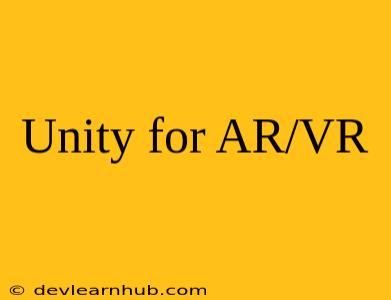Unity: A Powerful Platform for AR/VR Development
Unity is a widely used game engine that has become increasingly popular for developing augmented reality (AR) and virtual reality (VR) experiences. Its robust features, intuitive interface, and vast community support make it a compelling choice for creators of all levels.
Key Features for AR/VR Development
1. Cross-Platform Support:
Unity allows you to develop your AR/VR projects for various platforms, including:
- Android: Develop immersive AR experiences for Android devices.
- iOS: Create AR apps compatible with Apple's ARKit.
- Windows: Develop VR applications for Windows Mixed Reality headsets.
- Oculus: Target Oculus Quest and Rift headsets with your VR projects.
- PlayStation: Develop VR experiences for Sony's PlayStation VR.
2. AR Foundation:
Unity's AR Foundation provides a unified API for building AR experiences across multiple platforms. It simplifies the process of interacting with AR devices, allowing you to focus on creating engaging content.
3. VR Toolkit:
The VR Toolkit in Unity offers a collection of tools and features specifically designed for VR development. It includes functionalities like:
- VR Input Manager: Handle input from VR controllers with ease.
- VR Camera: Create realistic VR experiences with dedicated camera settings.
- VR Graphics: Optimize your VR projects for immersive graphics.
4. Asset Store:
The Unity Asset Store is a treasure trove of pre-made assets, scripts, and tools for your AR/VR projects. You can find everything from 3D models and environments to advanced AR/VR plugins.
5. Scripting:
Unity uses C# as its primary scripting language, which is a powerful and versatile language for creating complex game logic and interactivity.
Advantages of Using Unity for AR/VR
- Ease of Use: Unity's intuitive interface and visual scripting capabilities make it relatively easy to learn and use, even for beginners.
- Community Support: Unity boasts a vast and active community of developers, providing ample resources, tutorials, and support.
- Extensive Documentation: Unity offers extensive documentation and tutorials to help you learn and troubleshoot.
- Performance Optimization: Unity provides tools and techniques to optimize your AR/VR projects for smooth performance across different devices.
Applications of Unity in AR/VR
Unity has been used to develop a wide range of AR/VR applications, including:
- Games: Immersive VR games and AR experiences that blend the real and virtual worlds.
- Training Simulations: VR training simulations for industries like healthcare, manufacturing, and aviation.
- Architecture and Design: AR/VR applications for visualizing architectural designs and creating virtual walkthroughs.
- Education and Entertainment: Interactive educational experiences and immersive entertainment applications.
Conclusion
Unity is a powerful and versatile platform for developing engaging and innovative AR/VR experiences. Its comprehensive features, ease of use, and strong community support make it an excellent choice for creators of all levels. Whether you are a seasoned developer or just starting out, Unity provides the tools and resources you need to bring your AR/VR ideas to life.
